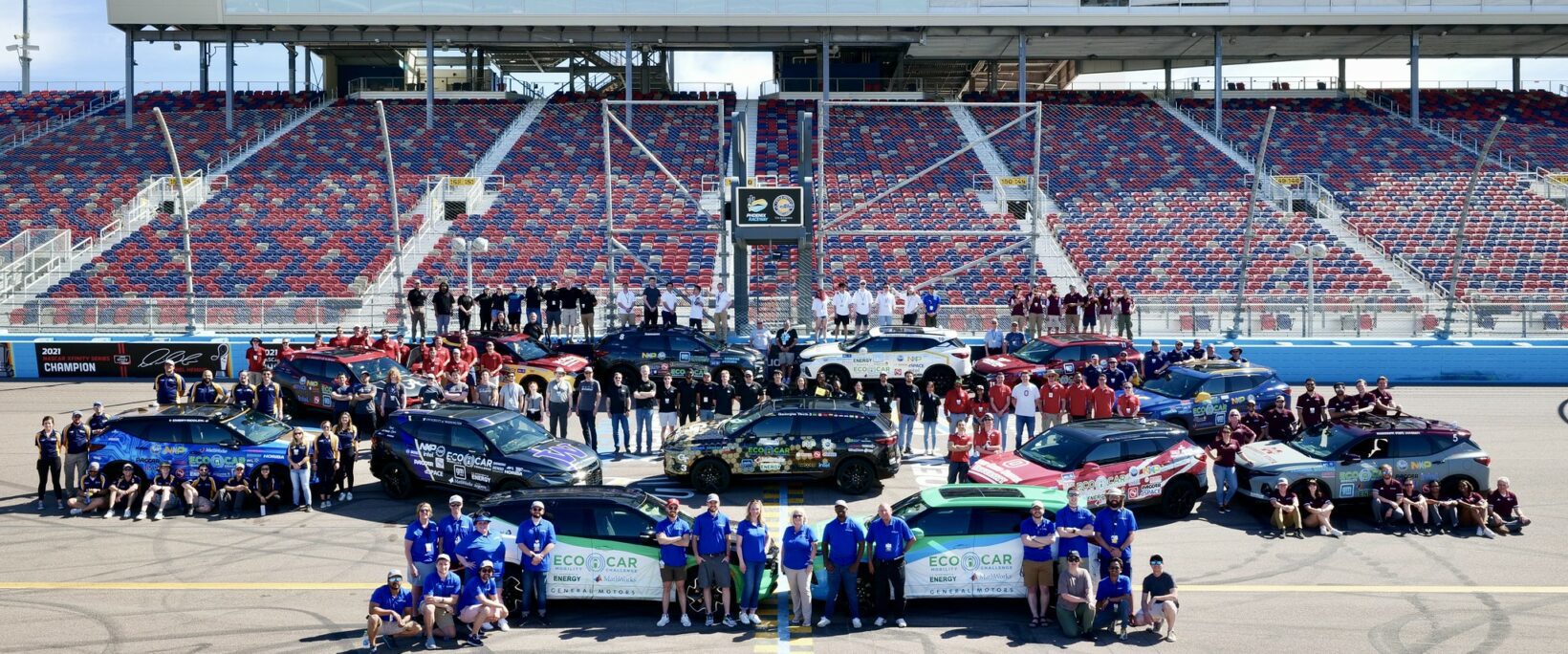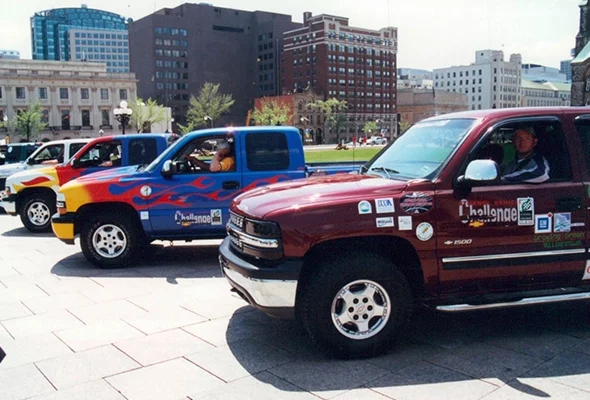
Past Competitions
Since 1988, the U.S. Department of Energy has sponsored 13 unique competition series. More than 30,000 students from 95 educational institutions in North America have participated, gaining real-world, hands-on experience tackling the challenges associated with building fuel-efficient vehicles.
Learn more about each of the unique competitions:
2018-2022
EcoCAR Mobility Challenge
The EcoCAR Mobility Challenge was a four-year competition series that challenged 11 university teams to apply advanced propulsion systems, as well as connected and automated vehicle technology to improve the energy efficiency, safety and consumer appeal of the 2019 Chevrolet Blazer.
2014-2018
EcoCAR 3
EcoCAR 3 was the 11th U.S. Department of Energy (DOE) Advanced Vehicle Technology Competition (AVTC) series and is North America’s premier collegiate automotive engineering competition. The U.S. DOE and General Motors are challenged 16 North American universities to redesign a Chevrolet Camaro into a hybrid-electric car to reduce environmental impact, while maintaining the muscle and performance expected from this iconic American car.
2011-2014
EcoCAR 2: Plugging into the Future
EcoCAR 2: Plugging In to the Future was a three-year collegiate advanced vehicle technology engineering competition established by the United States Department of Energy and General Motors (GM), and was managed by Argonne National Laboratory. The competition challenged 15 universities from across North America to reduce the environmental impact of the 2013 Chevrolet Malibu by improving its fuel efficiency and minimizing the vehicle’s emissions while retaining its performance and consumer appeal.
2008-2011
EcoCAR: The NeXt Challenge
EcoCAR: The NeXt Challenge was a three-year collegiate advanced vehicle technology engineering competition established by the United States Department of Energy (DOE) and General Motors (GM), and was managed by Argonne National Laboratory.
2004-2008
Challenge X: Crossover to Sustainable Mobility
In the first decade of the new millennium, the American automotive customer market trended toward larger family-sized vehicles. At the same time, an increased need to reduce energy consumption, as well as decreased vehicle emissions, was becoming imperative. As a result, the automotive and electronics industries, the U.S. and Canadian governments, and the academic community worked together to launch Challenge X: Crossover to Sustainable Mobility.
1999-2004
FutureTruck
In the early 2000s, the demand for light-duty trucks, sport utility vehicles (SUVs), and vans posed opportunities and challenges for the automotive industry. In response to this demand, General Motors and Ford Motor Company teamed up with the U.S. Department of Energy to create FutureTruck.
1997-1999

Ethanol Vehicle Challenge
The Ethanol Vehicle Challenge was developed to demonstrate the potential of ethanol to significantly lower emissions, improve performance, increase fuel efficiency, and improve cold starting of vehicles. During the three years of this Advanced Vehicle Technology Competition, the platform changed from a 5-passenger Chevrolet Malibu to a full-size Chevrolet Silverado to reflect consumer demands for larger vehicles and more power.
Learn More1995-1999
FutureCar
FutureCar Challenge, conducted annually between 1995 and 1999, challenged North American universities to design and apply advanced technologies to mid-sized sedans. Parallel to the goals of the Partnership for a New Generation of Vehicles (PNGV), the FutureCar Advanced Vehicle Technology Competition (AVTC) series utilized advanced technologies and hybrid electric vehicle powertrains to achieve 80 miles per gallon, while offering the same comfort, safety, and affordability that consumers expected from conventional vehicles.
1995-1997
Propane Vehicle Challenge
The Propane Vehicle Challenge (PVC), held between 1995 and 1997, focused on converting 1996 Chrysler Minivans into dedicated propane vehicles, while maintaining the performance that consumers expected from gasoline vehicles.

1993-1995
Hybrid Electric Vehicle (HEV) Challenge
The Hybrid Electric Vehicle (HEV) Challenge, conducted annually for three years, was an intercollegiate competition created by the U.S. Department of Energy (DOE) and the Society of Automotive Engineering (SAE). The HEV Challenge began with 18 Ford Escorts and 12 Ground-Up vehicles in 1993, 12 Saturn SL2 sedans were added in 1994, and 12 Dodge Neons were added in the 1995 HEV Challenge.
1991-1993
Natural Gas Vehicle (NGV) Challenge
The Natural Gas Vehicle (NGV) Challenge began in 1991 when General Motors donated a GMC Sierra 2500 pickup truck to 24 engineering schools that submitted the best design proposals for the purpose of converting the vehicles to dedicated natural gas use. Natural gas was selected as the next fuel for the students to work with because the U.S. has an abundance of domestic natural gas resources and many natural gas companies were promoting its use in motor vehicles.
1988-1989
Methanol Marathon
Methanol Marathon (1988-1989) was an alternative fuels competition for 15 colleges and universities in North America. Sponsored by the U.S. Department of Energy and General Motors Corporation, schools were selected based on the best proposals for converting 1988 Chevrolet Corsicas to operate on M85 (85% methanol, 15% hydrocarbons). General Motors provided kits of specialized parts to assist the schools with the conversion and teams were tasked to re-engineer these vehicles in under five months.

